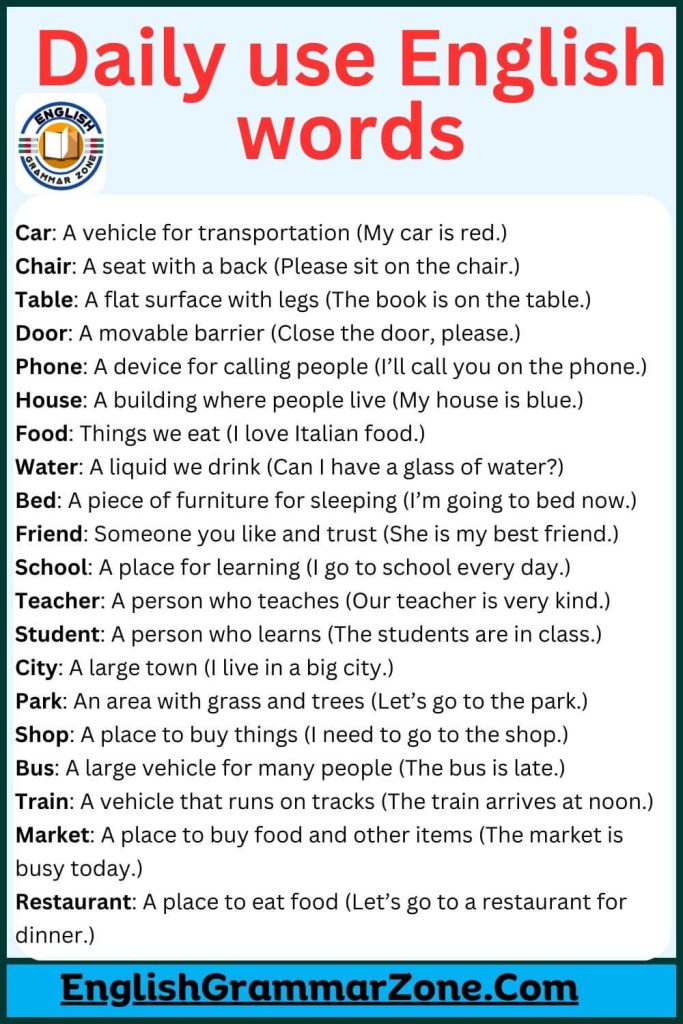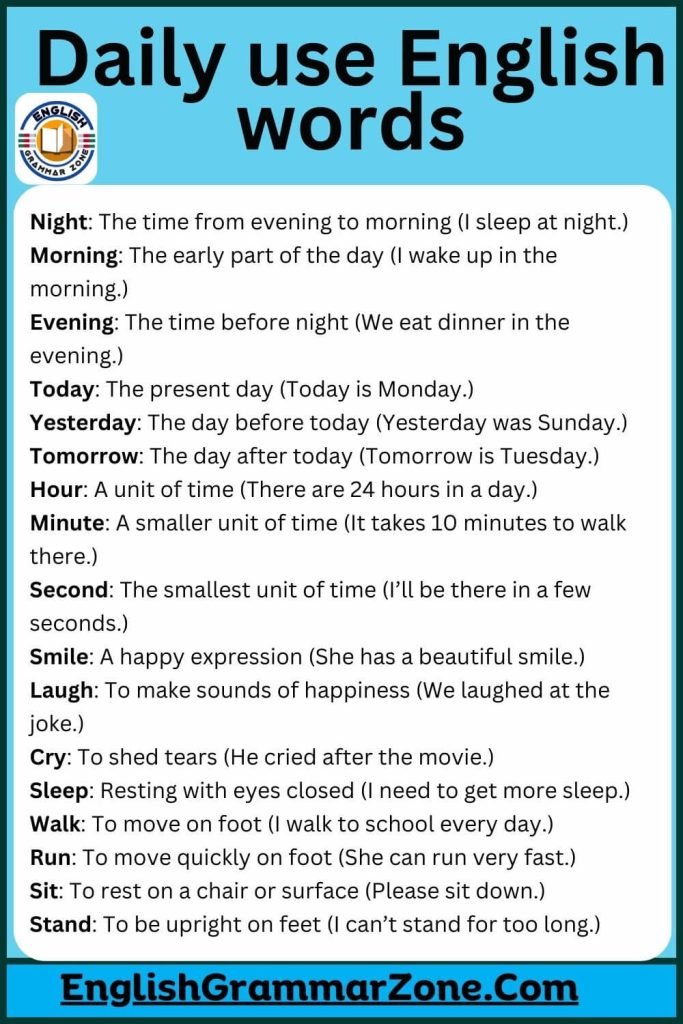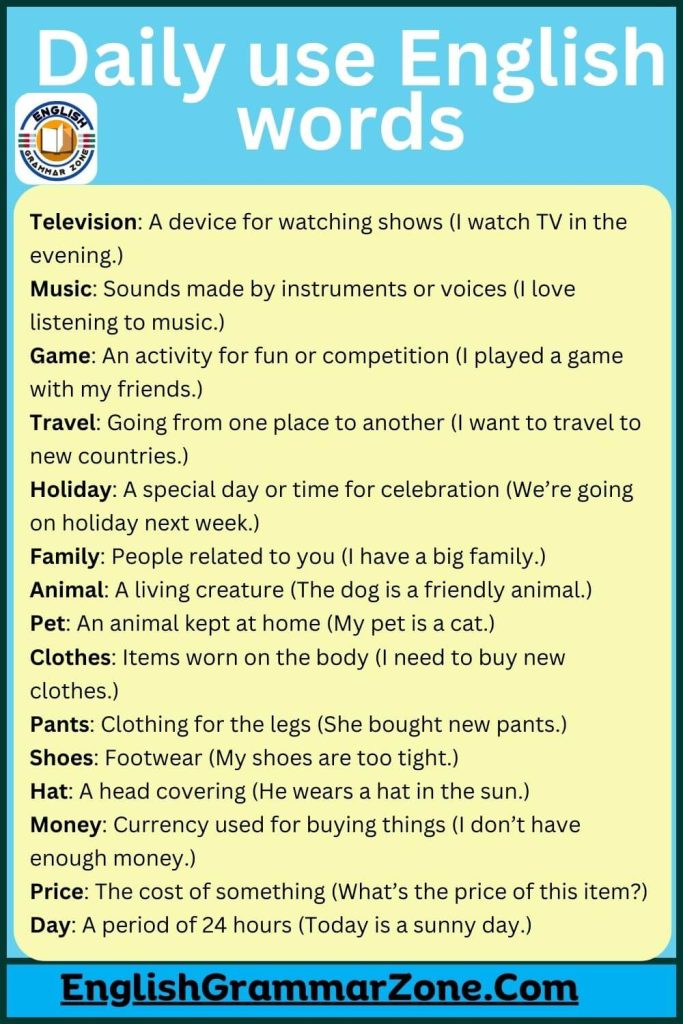Mastering daily use English words is essential for anyone looking to improve their communication skills. Whether you’re a student, a professional, or someone learning English as a second language, familiarizing yourself with commonly used words can make everyday conversations smoother and more effective. These words form the foundation of English communication, helping you express your thoughts, ask questions, and respond confidently. In this guide, we’ll explore the importance of learning daily use English words, provide practical tips to expand your vocabulary, and answer frequently asked questions to help you in your learning journey.
Daily use English words
- Book: A set of pages with information or stories (I read a book every night.)
- Car: A vehicle for transportation (My car is red.)
- Chair: A seat with a back (Please sit on the chair.)
- Table: A flat surface with legs (The book is on the table.)
- Door: A movable barrier (Close the door, please.)
- Window: An opening in the wall for light and air (The window is open.)
- Phone: A device for calling people (I’ll call you on the phone.)
- House: A building where people live (My house is blue.)
- Food: Things we eat (I love Italian food.)
- Water: A liquid we drink (Can I have a glass of water?)
- Bed: A piece of furniture for sleeping (I’m going to bed now.)
- Friend: Someone you like and trust (She is my best friend.)
- School: A place for learning (I go to school every day.)
- Teacher: A person who teaches (Our teacher is very kind.)
- Student: A person who learns (The students are in class.)
- City: A large town (I live in a big city.)
- Park: An area with grass and trees (Let’s go to the park.)
- Shop: A place to buy things (I need to go to the shop.)
- Doctor: A person who helps sick people (I’m going to the doctor.)
- Bus: A large vehicle for many people (The bus is late.)
- Train: A vehicle that runs on tracks (The train arrives at noon.)
- Market: A place to buy food and other items (The market is busy today.)
- Restaurant: A place to eat food (Let’s go to a restaurant for dinner.)
- Computer: An electronic device for work and play (I use my computer for studying.)
- Television: A device for watching shows (I watch TV in the evening.)
Daily Use English Words
- Music: Sounds made by instruments or voices (I love listening to music.)
- Game: An activity for fun or competition (I played a game with my friends.)
- Travel: Going from one place to another (I want to travel to new countries.)
- Holiday: A special day or time for celebration (We’re going on holiday next week.)
- Family: People related to you (I have a big family.)
- Animal: A living creature (The dog is a friendly animal.)
- Pet: An animal kept at home (My pet is a cat.)
- Clothes: Items worn on the body (I need to buy new clothes.)
- Shirt: A piece of clothing for the upper body (I’m wearing a blue shirt.)
- Pants: Clothing for the legs (She bought new pants.)
- Shoes: Footwear (My shoes are too tight.)
- Hat: A head covering (He wears a hat in the sun.)
- Bag: A container for carrying things (I need a new bag for school.)
- Money: Currency used for buying things (I don’t have enough money.)
- Price: The cost of something (What’s the price of this item?)
- Day: A period of 24 hours (Today is a sunny day.)
- Night: The time from evening to morning (I sleep at night.)
- Morning: The early part of the day (I wake up in the morning.)
- Evening: The time before night (We eat dinner in the evening.)
- Today: The present day (Today is Monday.)
- Yesterday: The day before today (Yesterday was Sunday.)
- Tomorrow: The day after today (Tomorrow is Tuesday.)
- Hour: A unit of time (There are 24 hours in a day.)
- Minute: A smaller unit of time (It takes 10 minutes to walk there.)
- Second: The smallest unit of time (I’ll be there in a few seconds.)
- Smile: A happy expression (She has a beautiful smile.)
- Laugh: To make sounds of happiness (We laughed at the joke.)
- Cry: To shed tears (He cried after the movie.)
- Sleep: Resting with eyes closed (I need to get more sleep.)
- Walk: To move on foot (I walk to school every day.)
- Run: To move quickly on foot (She can run very fast.)
- Jump: To push off the ground with legs (The kids love to jump.)
- Sit: To rest on a chair or surface (Please sit down.)
- Stand: To be upright on feet (I can’t stand for too long.)
- Read: To look at and understand written words (I like to read books.)
- Write: To form letters or words on paper (He writes in his notebook.)
- Speak: To talk or say words (Can you speak more slowly?)
- Listen: To hear carefully (Listen to the music.)
- Hear: To perceive sound (Did you hear that noise?)
- See: To perceive with eyes (I can see the mountains.)
- Look: To direct eyes at something (Look at that bird.)
- Show: To display something (Can you show me your drawing?)
- Give: To provide something (I will give you a gift.)
- Take: To receive or grasp (Please take this note.)
- Find: To discover something (I can’t find my keys.)
- Lose: To misplace something (I lost my wallet.)
- Start: To begin something (Let’s start the meeting.)
- Finish: To complete something (I finished my homework.)
- Cook: To prepare food (She likes to cook dinner.)
- Eat: To consume food (Let’s eat lunch.)
- Drink: To consume liquids (He drinks water every day.)
- Clean: To remove dirt (I need to clean the kitchen.)
- Wash: To clean with water (Wash your hands before eating.)
- Dry: To remove moisture (Dry the dishes with a towel.)
- Help: To assist someone (Can you help me with this?)
- Need: To require something (I need a new phone.)
- Want: To desire something (I want a new book.)
- Like: To enjoy or prefer (I like chocolate.)
- Love: To have deep affection (I love my family.)
- Hate: To strongly dislike (I hate waiting in lines.)
- Ask: To request information (Can I ask you a question?)
- Tell: To give information (Tell me your name.)
- Give: To provide something to someone (Give me your book.)
- Receive: To get something (I received a letter.)
- Say: To speak words (What did you say?)
- Answer: To reply to a question (Please answer the question.)
- Question: A sentence asking for information (I have a question.)
- Answer: A reply to a question (The answer is 42.)
- Explain: To make something clear (Can you explain that?)
- Understand: To grasp meaning (I don’t understand this word.)
- Remember: To recall something (Remember to call me.)
- Forget: To fail to remember (I forgot your birthday.)
- Talk: To have a conversation (Let’s talk about your plans.)
- Discuss: To talk about something (We will discuss the project.)
- Agree: To have the same opinion (I agree with you.)
Daily Use English Words


